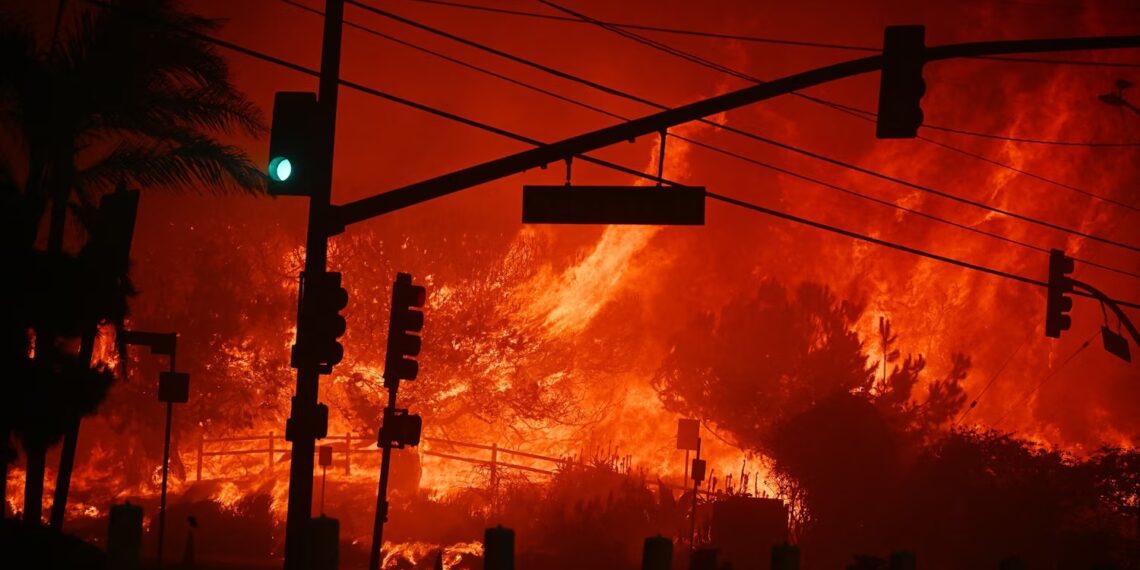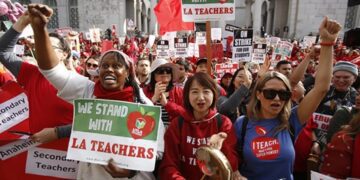By John F. Di Leo, Opinion Contributor
California is burning.
This isn’t a shock; conditions are such in California that certain areas, particularly in and around Los Angeles, are particularly susceptible to wildfires.
So the fast-spreading fires plaguing Los Angeles in January, 2025 represent a risk to be expected – by residents, businesses, and government. They have been through such threats again and again over the years. Sometimes these fires are caused by arson, sometimes by nature. It’s a hot, dry area; the risk is real.
In the moment, the local response is to fight the fires, evacuate the threatened areas, and care for the people who are displaced.
And for the rest of us, watching this story from a distance – far removed from the action, states away, time zones away, from that peculiar, beautiful, dangerous state – all we can do is pray for those affected, and hopefully, learn something from it that we can apply in our own states. Because there is a lot to learn.
California is unlike any other state. It has, objectively, the most beautiful scenery, the most fortunate coastline, the most bountiful agricultural land, the most wonderful beaches, oil fields, natural seaports – it’s amazing how many positives California can boast. Yes, there are natural risks too – a world-famous earthquake fault line, a propensity for drought in the southwest, a high risk of wildfires.
But you could grow enough food in California to feed a nation; you can produce enough milk and butter, enough fruits and vegetables, enough wine and cheese. And in fact, they do.
Back when President Ronald Reagan was the governor – he served two terms, from 1967 to 1975 – California stood as the seventh ranking economic power in the world. The state practically invented the movie business, the American wine business, the computer industry. We think of these global industries by associating them with regions of California: Hollywood, Napa Valley, Silicon Valley.
Such a state should be an economic growth engine without par, shouldn’t it? The state should be a wealth-generation machine, a fountain of perpetual prosperity. And with such a solid tax base, the government should easily be able to afford things that would be out of reach for other less-fortunate states, things that poorer countries can’t even afford to dream of.
California should have the most robust fire-fighting operation in the world. It should have everything from fire engines and fire hydrants to firefighting planes and helicopters. If anyone can afford to be prepared for natural disasters, it’s California.
31 years ago, in January, 1994, the 6.7 Northridge Earthquake destroyed the 10 Freeway, a critical part of the metro Los Angeles traffic system. Governor Pete Wilson rebuilt it in record time, under budget and ahead of schedule. California was still an economic powerhouse in those days, and could muster the necessary resources to meet a true natural disaster.
Today, California is a different state entirely.
Under Gavin Newsom and his recent predecessors, California has settled into a permanent economic tailspin, as employers and employees alike are fleeing the state for saner territories. Businesses long associated with The Golden State are relocating to Nevada, Texas, New Mexico, Arizona. When U-Haul publishes its state-by-state rental-imbalance statistics, California regularly rivals Illinois for the most people leaving.
So who remains in California, as its tax base shrinks?
California still attracts criminal gangs, illegal aliens, welfare recipients, homeless people.
California restricts water rights so that its farming and ranching businesses shrink. California restricts energy production so that energy-intensive businesses have to move, because there’s no power for them to stay. California outlaws gasoline-powered vehicles, then shuts down its power plants so that people with electric vehicles cannot charge them.
California has welcomed in at least 2 million illegal aliens, and happily spends its tax dollars to put them up in hotels that their legitimate taxpayers can’t afford to stay in.
California spends hundreds of millions of dollars to provide taxpayer-funded housing for homeless people, and wonders why ever more homeless people are drawn to California.
California has spent billions of dollars on a 463 mile high speed rail project, pointlessly attempting to connect Los Angeles and San Francisco – a project that will never be done and will likely never carry a single passenger, as its cost has outpaced any possible dream of cost-effectiveness, on a path to blowing past the $100 billion mark.
It didn’t have to be this way.
California could still be on the economically upward trajectory it enjoyed half a century ago. In the days of Reagan, Deukmejian and Wilson, California was still attracting entrepreneurs and corporate giants alike; it was still a desirable place to situate a factory, a world headquarters, a research park – and that means it was a desirable place for such businesses’ employees to live and raise a family.
But as the world has seen in many other one-time economic giants, such as Venezuela, Cuba, Argentina, even Great Britain, economic prosperity is not self-perpetuating or guaranteed; destructive governmental policy can always kill the goose that lays the golden egg.
To destroy a state, all it takes is a few years of foolish policies – intentionally attracting indigents and criminals through generous welfare programs and soft-on-crime policies, intentionally driving businesses away through high tax rates, onerous regulations, and untrustworthy civil services.
What a wonderful state California once was, and what a wonderful state it could still be today.
But thirty years of leftist policies have crippled the state’s economy, drained its budget, squandered its resources on wastrels and bureaucrats.
So when the people and businesses of the state are threatened – when the few remaining homeowners and employers find themselves in the path of a wildfire that their state ought to be able to fight, but cannot – all they can do is flee, and kick themselves for staying this long.
And start scouting other states to move to when the smoke clears, so they don’t get stuck in such a situation ever again.
Copyright 2024 John F Di Leo
By Amanda Szulc, Opinion Contributor As a conservative Christian writer committed to honoring God, defending truth, and standing in the light, I approach this analysis with a conviction...
Read moreDetails








